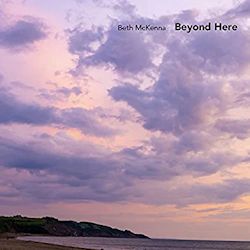 BUY NOW AmazonUK AmazonUS |
BETH McKENNA Beyond Here |
Beth McKenna (saxophones, flute, clarinet, vocals): François Jalbert (electric guitar, effects): Guillaume Martineau (piano, NORD, Wurlitzer, Fender Rhodes): Olivier Babez (electric and upright bass): Peter Colantonio (drums): Sarah Rossy (vocals)
Recorded April 2021, Studio MixArt
Intro: Beyond Here
Perspective
Interlude: Not Alone
Streets of Mexico City
Interlude: Finding A Place
Far from Familiar Ground
Tides
Divided to One
Interlude: Indifference
Letting Go
Interlude: Human Malfunction
Running Out
After the Storm
Ele(ctro)phant
Saxophonist, bandleader and composer Beth McKenna is a strong presence in the Montreal scene and a punchy, galvanic performer. Her latest album was written pre-Covid but recorded in April 2021 and shows her operating at a high level with her equally youthful confreres.
Introductions and Interludes have become something of a near-ubiquitous feature of recent jazz albums. They’re not something that appeal to me, largely because they aren’t properly vehicles for improvisation, more opportunities for compressed sonic contrasts. But here they are rather more complex and interesting than one often finds – the Intro: Beyond Here, for instance, sees her sax taken to ethereal heights and the first Interlude, Not Alone introduces her fine flute playing. The richly expressive nature of the next interlude Finding a Place shows that McKenna has thought about the function and value of these interludes and how they can successfully be integrated into an album.
Her self-penned CD looks at issues such as planetary crisis and autobiographical elements, yet other than relating this in her liner notes, one would never know. This is a musical album not a polemical one and the catchy hook of Perspective attests to the engaged sense of vibrancy that she can generate from her material – along with electronica and a vocalise in the mix. Guillaume Martineau’s funky keyboard enlivens Streets of Mexico City where the band’s ensemble sound is quite markedly rock-drenched. McKenna’s response is a raunchy sax line with a wailing Sarah Rossy vocal line on top to build up even more heat.
Lyricism co-exists with rock grooves, though as Far from Familiar Ground illustrates, its piano and sax styling is refined and elegant. Perhaps the track that best shows McKenna’s quality of building up and releasing tension is Tides, where colouristic percussion, internal contrasts and clever incremental pressure building generates great rewards and the music’s jubilant end is terrifically energising. In Letting Go, her tone reminded me of Jan Garbarek – the music’s lyric keening and warm romantic hues ushering in the piano’s more urgent amplitude in a creative, sympathetic way.
The raunchy, funky sides of her musical armoury fuse with blues-rich elements in Running Out – the last element incarnated in the piano solo in particular. All these qualities are held in fine balance. François Jalbert really comes to the fore in After the Storm with a strong electric guitar solo, the piano picking up his vibe and McKenna herself taking off on tenor, coiling and twisting in so serpentine a way I thought she would never untwist herself. She does. There’s a bit of deliberate rock distortion on this track and it’s by far the rockiest groove in the album. But the most ‘out there’ is the last track, Ele(ctro)phant with wa-wa electric guitar and a hard pumping rhythm courtesy of bassist Olivier Babez and drummer Peter Colantonio.
McKenna covers some stylistic ground. Tonally in the upper register she may suggest Garbarek from time to time but her tenor playing is no-holds-barred and she has clearly listened to Pat Metheny and Brad Mehldau. She and her colleagues embrace both the song and the sweat of a hard swinging, rock-tinged and funkily fuelled small band.
Jonathan Woolf